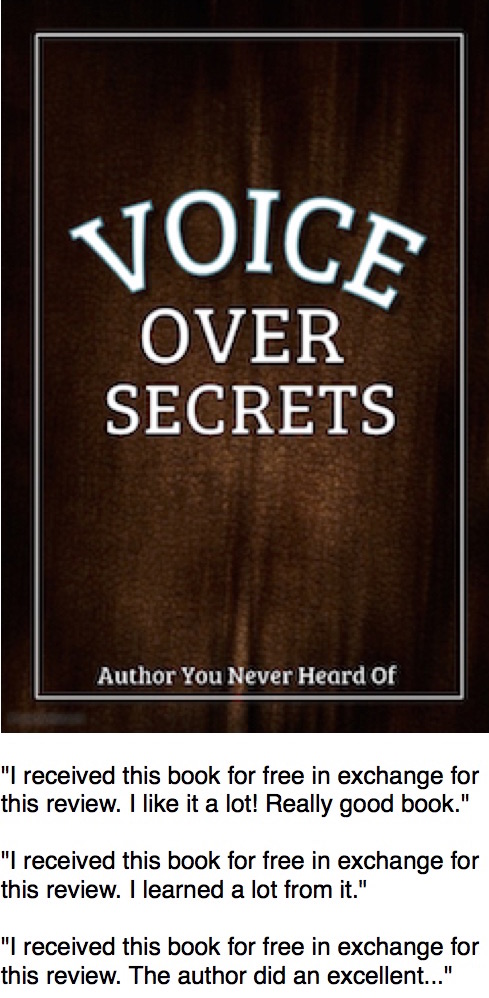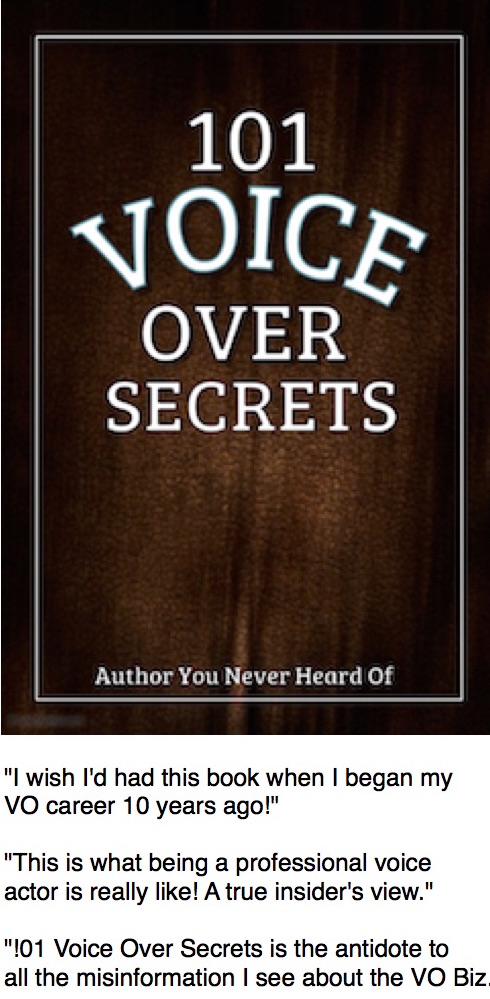The responses I’ve received from audiobook narrators to Tuesday’s video confirm several common fears and misconceptions that fuel the aversion many industry pros have toward “self-promotion.”
If you haven’t already watched the video announcing the 2018 Aikido Self Promotion for Audiobook Narrators Home Study class, you can check it out here.
In this posting, I’ll share with you the most common misconceptions your fellow audiobook narrators have…
The biggest pitfalls they must avoid….
Some verbatim “reasons” for not engaging in any real marketing or promotion….
And the one valid excuse many audiobook narrators have for not using simple, non-yucky self-promotion to transform their careers from “a constant struggle” to “consistently rewarding.”
Bogus Reasons for an Audiobook Narrator Not to Learn How to Promote
“Other People Can, But….”
“Some people are a natural at that kind of thing; I’m just not any good at it.”
or
“Other people can learn how to market or promote their professional services, but I wouldn’t be able to do it.”
You don’t need to be “a natural” to become good at something. You simply haven’t learned what those other people have learned.
None of us is immune to that built-in self-doubt.
When you experience self-doubt, you can surrender to it and pay the price for underestimating yourself…
…or you can go ahead and learn something new despite that self-doubt.
You want an embarrassing example?
A couple of years ago I was working on a project with someone who said, “I’ll just put all the info into an Excel sheet for you,” to which I replied, “That won’t work. I’ve never learned how to use a spreadsheet.”
To which she replied, via email, “Sad.”
I can read a spreadsheet.
But I don’t know how to make those columns and rows do whatever magical things they can do for me.
I’m sure if I took the time to learn how to use spreadsheets, I’d be able to master it.
When I’m tempted to give in to the intimidation of the unknown, I confront myself:
“Do you really believe you’re that much dumber than all those millions and millions of people who know how to use spreadsheets?”
No, I don’t believe that.
Before I learned how to publish a Kindle book, I didn’t know how to publish a Kindle book.
Before I learned how to create an iPhone app, I wouldn’t have dreamed of actually creating one and I wouldn’t have enjoyed the pride that resulted from having a successful app that people (including me!) found useful.
Lesson: Avoiding learning how to promote your own audiobook career because you’re “not a natural at it” is a cop-out. It’s a bogus excuse.
Confusing Activity with Progress
This is a huge mistake that entraps most of us at times.
“I spent an hour talking about audiobook production in an online forum, another few hours researching the best microphones, various solutions for lowering the noise floor in my studio, and all the suggestions everyone on the Internet has for avoiding vocal fatigue while recording. And I looked for every free online article about ‘self-promotion or marketing for audiobook narrators.’ I’ve been really productive!”
No, you’ve been busy but not productive.
You’ve been productive if you’ve actually advanced your career.
Otherwise, you’ve just been busy.
Verbatim Reasons Audiobook Narrators Have Given for Not Learning How to Promote Themselves
I’ll omit the names and any personally identifying information. But here’s a sample of the emails I’ve received in response to Tuesday’s video.
“I Took Other Classes That…”
“I’ve taken other classes from other people who claim to be ‘marketing experts,’ and they consisted mostly of clever-sounding ‘tricks’ and methods that don’t actually work in the real world.”
Aikido Promotion doesn’t rely on tricks or instant “push button” solutions. If you’ve paid your dues as a narrator/producer…
If you have the talent, training, and storytelling skills needed to voice and produce quality audiobooks for skilled authors who are looking for someone to trust with “their baby”….
You don’t need to resort to silly, hyped-up tricks.
Leave the “tricks,” the Easy Buttons and the spamming to the amateurs.
“I Bought a Database”
“I paid to take a class that ended up telling me I needed to buy their magical database of prospects. The only results I saw from that were getting tons of my emails returned as ‘not deliverable’ and having a few of the recipients report me as a spammer to my email hosting service.”
I’m sorry you fell for that scam.
Someone took advantage of your desire to succeed with audiobooks and made you believe that the best way is to spam as many people as possible.
In reality, that’s the fastest, surest way to brand yourself as clueless amateur.
It wasn’t your fault.
You didn’t know better, and you put your trust in someone who had your wallet and not your best interests at heart.
“I Pay To Give Away My Audiobooks”
“I already engage in self-promotion: I paid (Website) so I could send my ACX promo codes to their list so that their volunteer reviewers would post reviews of my audiobooks.
“(Website) said that in addition to the sales I’d get from those reviews being posted onlne, I’ll attract lots of new fans from the huge word of mouth I’d get from the people who get a free copy of my audiobook and then tell all their friends about it.”
If only.
Consider:
You happen to overhear two drunks in a bar, talking about how great their doctor is.
Is that going to motivate you to seek out that doctor when you’re sick?
Probably not.
Not all word of mouth is created equal.
And not all audiobook reviews are created equal.
A key principle of Aikido Promotion is empathy — the ability to relate to another person’s emotional experience from their perspective, to imagine yourself “in their shoes.”


So, let’s put ourselves in the shoes of someone who wants to learn…Oh, let’s say voice over.
As it happens (in this imaginary scenario), there are two books listed for sale on Amazon.com.
One is entitled VOICE OVER SECRETS and the other is called 101 VOICE OVER SECRETS.
You’ve never heard of either author.
VOICE OVER SECRETS has 8 positive reviews, all of which begin with the words, “I received this book for free in exchange for this review.”
Meanwhile, 101 VOICE OVER SECRETS has only four reviews…all of them positive, and all from real voice actors who actually purchased the book.
Which one are you going to buy?
Of course.
You’re going to choose the one that actually has been read by voice actors over the one that apparently has been read only by people who didn’t have to pay for it.
A bunch of reviews saying “I listened to this audiobook because I got it for free” also sends the unfortunate message that either no one actually is buying that audiobook or that no one who has bought that audiobook thinks enough of it to leave a review.
That type of website makes money by your paying them to allow you to give away your valuable promo codes.
The people on the site’s freebie list come out ahead because they get all the audiobooks they want…for free.
And you, the narrator?
You get to see some enthusiastic reviews of your title and try to pretend they’re from real customers.
Even more insidiously, you get to feel as though you’re doing something meaningful to enhance your career.
That’s a real trap that all of us can fall prey to if we’re not careful: confusing “busy work” that makes no real impact on our careers with smart marketing and promotion that fuels the genuine, constant growth of our business.
Your One Genuine Stumbling Block:
“I Don’t Know Where to Start”
“I don’t know where to start” is the one genuine stumbling block that everyone has to overcome to succeed.
If no one has shown you how to promote yourself effectively, of course you don’t know where to start.
The only way to overcome “not knowing where to start” is to have someone with a proven track record show you how it’s all done. Registration for the 2018 Aikido Self Promotion for Audiobook Narrators class has closed. If you’d like to be notified if I decide to teach this class again, just enter your name and email in Alert List use the box below.
Reviews from previous Aikido Self Promotion Students
(opens in new window)





